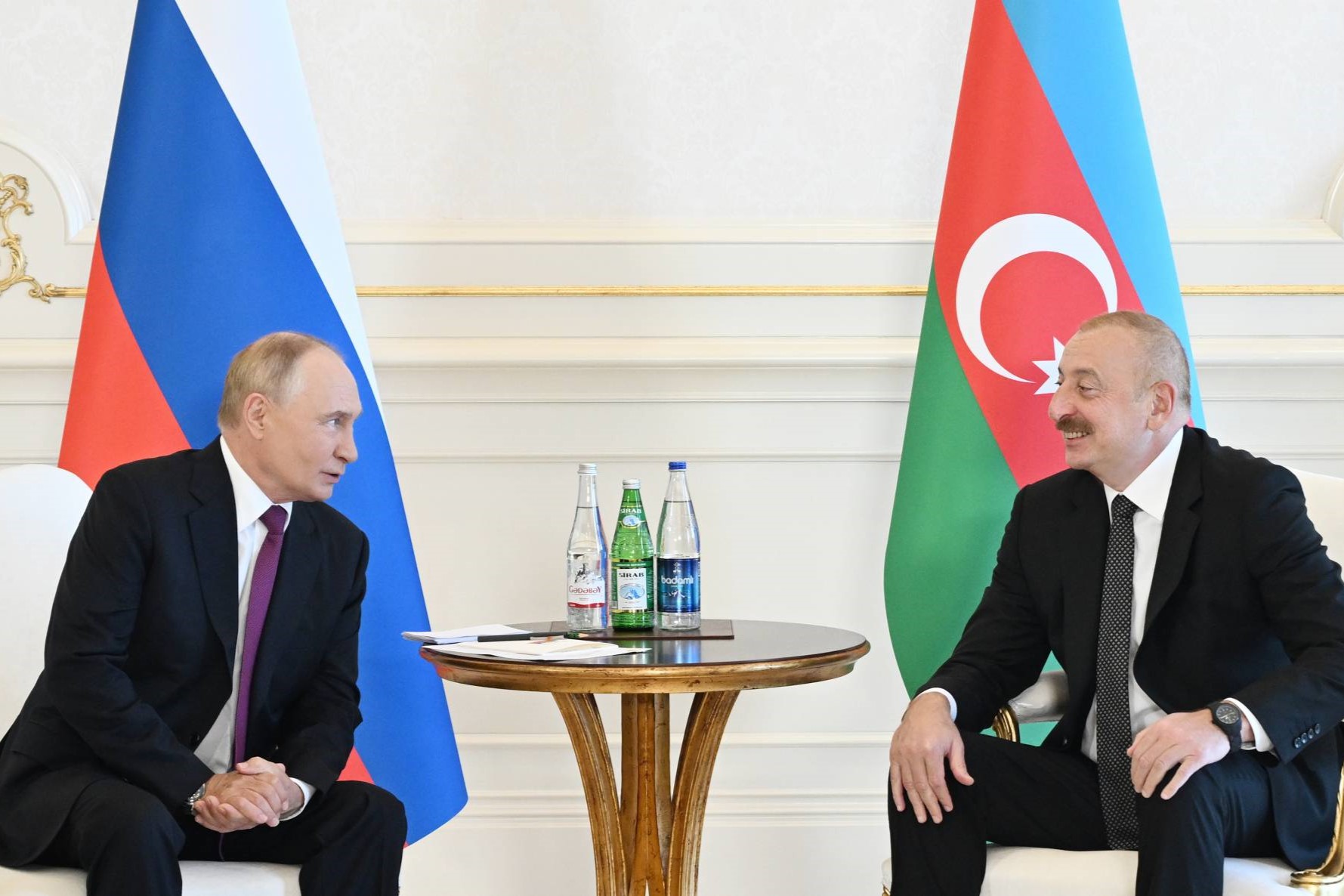
A group of pro-government Azerbaijani NGOs have drafted a statement accusing Armenia of assisting Russia in evading Western sanctions, despite trade between Azerbaijan and Russia also steadily growing since the full-scale invasion of Ukraine.
On 17 September, 10 Azerbaijani NGOs published the open letter addressing officials responsible for imposing and implementing sanctions against Russia in the US and EU. They cited a ‘sharp increase’ in trade between Armenia and Russia since the beginning of its full-scale invasion of Ukraine, quoting Russian Deputy Minister Alexei Overchuk speaking about Russian–Armenian economic ties during a visit to Yerevan in mid-September.
‘In 2023, our mutual trade grew by 55.8%, up to $7.4 billion. This year, the growth has accelerated. Over the first six months alone, bilateral trade accounted for $8.4 billion. We may well reach the $14 billion–$16 billion mark by the end of the year. In 2020, it was $2.3 billion’, said Overchuk at the time.
Overchuk’s visit to Armenia followed a high-profile visit by Russian President Vladimir Putin to Azerbaijan, which largely focused on economic ties between Russia and Azerbaijan.
[Read more: Putin visits Azerbaijan to discuss economic cooperation and conflict]
During the visit, Putin said that annual trade between the two countries had surpassed $4 billion, adding that there was potential for future cooperation in industry, transportation, logistics, and light industry.
‘More than $4 billion of direct investment in the Azerbaijani economy is also a positive indicator. There are more than 1,270 entities with Russian capital operating in Azerbaijan, and this number is certainly not the limit’, he added.

What about Azerbaijan and Georgia?
Sabit Baghirov, the chair of the Entrepreneurship and Market Economy Development Assistance Fund, one of the organisations that signed the letter, told OC Media that their collective decried Russia’s invasion of Ukraine as a ‘merciless war’, and that they had specifically targeted Armenia for its high dependence on Russian trade compared to Azerbaijan and Georgia.
He said that Russia’s share in Armenia’s foreign trade was 37%, while that figure was 8.5% for Azerbaijan and around 11% for Georgia.
However, independent economist Rovshan Aghayev told OC Media that trade turnover with Russia had dramatically grown in both Armenia and Azerbaijan since 2021.
‘Objective analysis should speak about every fact. Our trade turnover was $55 million in 2021, but in 2023, it was around $1 billion.’
He said this included not just a growth in exports from Azerbaijan to Russia, but also imports of Russian oil and gas to Azerbaijan.
Azerbaijan’s economy relies heavily on its fossil fuel production, with Europe looking to Azerbaijani gas as an alternative to Russian energy following Russia’s invasion of Ukraine. Many have suggested that Azerbaijan could be supplying Europe with gas imported from Russia.
Government pressure on NGOs
All 10 organisations that signed the letter appear to receive funding from or have ties to the government.
Since November 2023, Azerbaijan has begun a crackdown on the last remnants of independent media and civil society in the country, often on financial charges.
One of the organisations listed on the letter, the Centre for Economic and Social Development, appears to be headed by MP Vugar Bayramov, with the organisation’s website appearing to be largely focused on his work and statements.
Bayramov was re-elected as an MP in September’s snap parliamentary elections. He is the brother of Gubad Ibadoghlu, a prominent government critic and anti-corruption campaigner, who was arrested in July 2023 on charges of production, acquisition, or sale of counterfeit money or securities committed by an organised group. He was later charged with the preparation, storage, or distribution of religious extremist materials.
The Azerbaijan Accountant and Risk Professionals, another signatory organisation, was previously headed by Rufat Mahmud, who is currently serving as the director of Azerbaijan’s state petrol company SOCAR in Russia.
Sabit Baghirov, the head of the Entrepreneurship and Market Economy Development Assistance Fund, which signed the statement, appeared to admit that Azerbaijani NGOs did not criticise their own government because they relied on government funding.
He said that while it was in the country’s interest for NGOs to carry out their work effectively, the ‘overwhelming majority’ of NGOs left in Azerbaijan received grants only from the government to continue their ‘limited activities’.
‘[The] restriction of NGO activities in our country; the situation is not encouraging. Our access to diverse sources of funding has for 10 years reached almost their minimum level’, he said.
‘Now tell me, which ministry or committee allocates a grant to monitor its own activities? None of them.’









